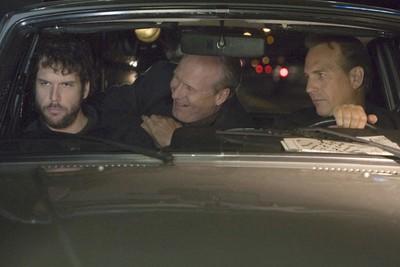Costner, Hurt bright lights in murky ‘Mr. Brooks’
As the promotions for "Mr. Brooks" inform us, "Everyone has two sides: good and evil."
But not every movie has two sides. Not the good ones, anyway.
Alas, "Mr. Brooks" doesn't quite qualify as good, despite several commendable elements. Including, much to our surprise and gratitude, Kevin Costner.
It's been a long time since Costner's "Bull Durham"/"Dances With Wolves" heyday, but he still can command a movie screen.
Generally, he does it from the position of charming scoundrel ("The Upside of Anger") or grizzled authority ("The Guardian").
In "Mr. Brooks," he does so in the title role: devoted husband and father, corporate bigwig, upstanding citizen, serial killer.
It's not that Mr. Brooks wants to kill. It's an addiction -- one encouraged by the diabolically persuasive voice in his head, a voice he calls Marshall.
In the movie, no one but Mr. Brooks can see or hear Marshall. Fortunately, we can -- because he's embodied by the inimitable William Hurt, who delivers another gleefully evil performance (a bit reminiscent of his "History of Violence" cameo) full of scenery-chomping gusto.
Naturally, Marshall doesn't want Mr. Brooks to stop his murderous ways as Portland's mysterious Thumbprint Killer. After all, if Mr. Brooks resists his impulses to kill, what will happen to Marshall?
But there's not much chance of that -- not when Mr. Brooks slips up at the scene of a crime, bringing him into contact with Mr. Smith (in-your-face comedian Dane Cook, dialing down the obnoxiousness -- a bit). He's an amateur photographer, and veteran voyeur, who catches Mr. Brooks in action.
Most people in that position would call the cops. Instead, Mr. Smith blackmails Mr. Brooks into showing him how to stalk and kill an unsuspecting victim.
Of course, that doesn't mean the cops aren't on the trail of the Thumbprint Killer -- especially one dogged detective, Tracy Atwood (Demi Moore, back in kick-butt mode), whose path will cross his in teasingly convoluted style. But not before we're treated to some knotty complications in her life.
Yes, she's got a secret. Everybody does. (Except for Marshall, who seems to be the only honest guy around. And his secret is safe with Mr. Brooks.)
Throughout, screenwriters Bruce A. Evans and Raynold Gideon ("Stand By Me," "Star Man") try -- oh my, how they try -- to weave the movie's disparate plot strands into something resembling a coherent, cohesive whole.
It doesn't always work. But it would work better if Evans, in his second directorial effort (his first was 1992's eminently forgettable "Kuffs") knew a bit more about building, and sustaining, suspense.
There are numerous times in "Mr. Brooks" when the script tells us we should be gnawing our knuckles and holding our breaths. But Evans' plodding pacing undercuts the suspense; our anxiety is as much for things to get moving as it is about the characters and their fates.
That we care as much as we do about Mr. Brooks and his make-believe partner in crime, Marshall, is a tribute to Costner and Hurt. Their symbiotic Jekyll-and-Hyde interplay -- Costner ably suggesting the turmoil beneath the buttoned-down exterior, Hurt reveling in his unhinged malevolence -- proves the best thing about this good-and-bad thriller.
CAROL CLINGMORE COLUMNS
REVIEW movie: "Mr. Brooks" running time: 120 minutes rating: R; strong bloody violence, graphic sexual content, nudity, profanity verdict: C+ now playing: Boulder, Cannery, Cinedome, Green Valley, Neonopolis, Palms, Rainbow, Red Rock, Santa Fe, South Point, Suncoast, Sunset, Texas






















